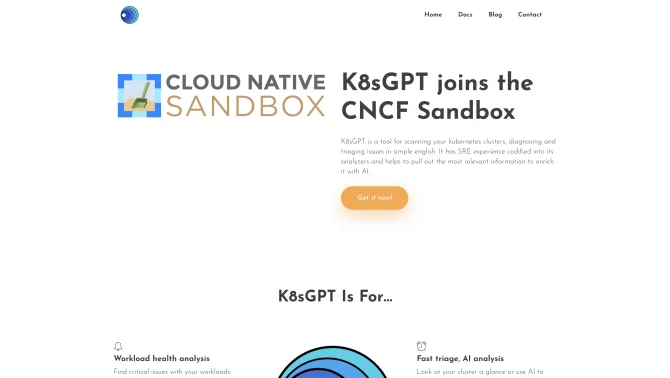Introduction
K8sGPT is a pioneering AI tool that integrates with Kubernetes to provide users a comprehensive suite of diagnostic and analytical capabilities. It empowers users to scan their Kubernetes clusters, diagnose issues, and triage problems using simple English commands. By codifying Site Reliability Engineering (SRE) knowledge, K8sGPT offers an intelligent approach to cluster management, making it an indispensable tool for DevOps engineers and SREs.
background
Developed by a team of experts with a deep understanding of Kubernetes and AI, K8sGPT has emerged as a leading solution in the cloud-native ecosystem. With a strong presence on GitHub and a dedicated website, K8sGPT continues to evolve, offering cutting-edge features and robust support to its users.
Features of K8sGPT
PodAnalyzer
Analyzes pod configurations to detect potential causes of pod failures or excessive resource consumption.
PVCAnalyzer
Inspects Persistent Volume Claims for misconfigurations that could result in data loss or storage issues.
ServiceAnalyzer
Examines service settings to identify any potential disruptions or performance degradation.
DeploymentAnalyzer
Checks deployment configurations to find inefficiencies in resource utilization.
NodeAnalyzer
Investigates nodes within the Kubernetes cluster for health, usage, and capacity-related issues.
AI Analysis
Utilizes AI to enrich the analysis process, providing deeper insights and recommendations.
How to use K8sGPT?
K8sGPT can be installed via Homebrew or rpm, and configured with an OpenAI API key for AI processing. Users can perform various analyses, including default scanning, anonymous scanning for data security, and namespace-specific analysis.
FAQ about K8sGPT
- How do I install K8sGPT?
- You can install K8sGPT using Homebrew or by downloading the rpm package from the official release page.
- What AI backend does K8sGPT support?
- K8sGPT supports OpenAI as the default backend, with the option to switch to other providers like Azure OpenAI.
- How can I perform an anonymous scan?
- Use the '--anonymize' flag along with the 'analyze' command to perform an anonymous scan, which masks sensitive data.
- How do I analyze a specific namespace?
- Use the '--namespace' flag followed by the namespace name to focus the analysis on a specific area of the cluster.
- What does the AI analysis feature do?
- The AI analysis feature uses machine learning algorithms to provide a deeper understanding of the cluster's state and offer actionable recommendations.
Usage Scenarios of K8sGPT
Cluster Health Assessment
Regularly scan your Kubernetes clusters to assess overall health and identify potential issues before they affect operations.
Performance Optimization
Use K8sGPT to analyze resource usage and optimize deployments for better performance and cost-efficiency.
Troubleshooting
Quickly diagnose and resolve issues in specific resources or across the entire cluster with the help of AI-powered analysis.
Security Audits
Leverage K8sGPT's scanning capabilities to perform security audits and address vulnerabilities in your Kubernetes setup.
User Feedback
K8sGPT has been a game-changer for our Kubernetes cluster management, providing quick insights into potential issues with our deployments.
The AI-powered analysis has saved us hours of manual troubleshooting, allowing us to maintain high cluster performance with ease.
The ability to perform anonymous scans is a significant advantage, giving us peace of mind regarding data privacy.
K8sGPT's integration with our existing SRE workflows has streamlined our operations and improved our response times to cluster incidents.
others
K8sGPT has demonstrated its value in the Kubernetes ecosystem by providing a robust set of tools for cluster analysis and management. Its innovative approach to combining AI with traditional SRE practices has been well-received by the community, offering a new standard in cluster diagnostics.
Useful Links
Below are the product-related links of K8sGPT, I hope they are helpful to you.
